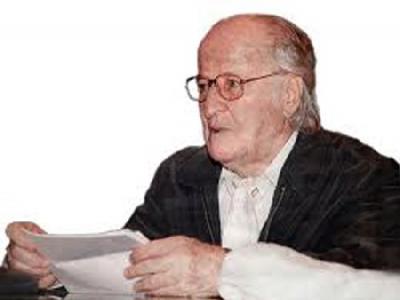It is four years since my father died. I thought I would get over it, but I haven’t. This is not a plea for sympathy, you know why I am telling you about my father’s death today, because his dear friend and neighbor, died today, Suleiman al-Issa.
Many glad memories are now in my head, when I was in school, I always loved his poems, and when I learned any poem, I used to go to his house, to recite to him, he always told me, to keep reading, studying, and working, he was very tenderhearted, affectionate, hard worker, never stopped working until he died, I have a lot of memories, but it is not the time to speak about now.
Quite simply, he has left a space that will never be filled; therefore he is, paradoxically, still here because the space is still here, all the children will feel it all the time. Death is not a ‘wound’ to be ‘healed’. Once someone privileged, has been in the world, he has always been in the world; and once has gone his absence will be in the world forever, part of the world; in Suleiman al-Issa case, he will remain part of all the Syrian children, this is a good thing.
Sulaiman al Issa was born 1921 in the village of Noayriyeh Oronte orchards, situated 20 Km to the west of the historical city of Antakya .
He received his first education under the mulberry tree shadowing, the house yard, he learned the Koran, the famous pre-Islamic poems (Mu’allaqat) which were hung in the holy Ka’ba, the famous Mutanabbi collection of poetry, and many other Arabic poems. The village had no other school; but the traditional Kuttab, which was also the poet’s home, his father lived and taught there.
He started writing poetry at the age of ten and his first collection described the misery and weariness of the peasants .
His primary education took place in Antakya. When he started school he was so advanced that he was placed immediately into the fourth class . By that time the district of Al Liwa , which included Antakya, was in a stage of revolution due to the Arab inhabitants discovering the plan of the French (who had a mandate in Syria at this time) to separate the area from Syria and offer it to Turkey .
During his fifth and sixth grades in Primary school, his poetry contributed to the demonstrations and national fight of his fellow- citizens of Liwa Iskenderun.
After the separation of his native district he emigrated to other parts of Syria to continue with his friends, the fight against the French Mandate . He continued his education in secondary schools at Hama ; Lattakia and Damascus . In that period of his life he experienced the bitterness of homelessness, and began to realize the importance for him of fighting for Arab unity, independence and freedom .
After the Arab Israeli war in 1967 he started writing for children and made it his primary concern .
His biography for children written in poetry and then in prose, was entitled ‘I am telling you my childhood, O small ones’ His second autobiography was ‘The child Waïl in his search for his homeland’.
With his wife Dr. Malake Abiad, who loved him a lot, he contributed translations of many literary books (from English and French into Arabic) mostly Algerian books originally written in French .
In October 1982 he received the Afro – Asian Writers’ Union Lotus Prize for poetry.
In 1984, his poetical works for children received the prize of the Arab League, Educational, cultural, and Scientific Organization.
– In 1990, he was elected as a member of the Arab Language Academy (Damascus).
– In 2000, he received The Babatin Prize for poetical creativity.
Remembering his early childhood, in the village
“My mother:
Daughter of the country;
Who never got tired;
She used to heat the oven,
Cook, and gather wood;
Receive us in the morning and evening
With the ode of hope,
The lessons of hard work;
Saying: « Work hard children, life is work».
Life is work.
Life is work.
She was right… Life is work.
Her eyes were full of ambition and hope.
All was lost in the whirlpool of poverty.
When she saw us learning,
Her eyes flashed with happiness,
And used to fill the house with pleasure;
And solemnly embrace the paper and inkpot.
She was deprived of the bless of light
Of the grace of learning, she was deprived
When darkness prevailed
She says to us: «to sleep».
Her songs were sad,
Oh! How sad her songs were!
Sleep songs, in winter,
When silence wrapped the evening,
And the tired slept;
Our down trodden people slept
Behind the walls of darkness,
Oh… free pigeon
How happy you are…!
May your memory be fragrant forever;
And forever flourishing in the heart,
Oh… my passionate mother;
Daughter of the village,
Whose image will never be forgotten by years”.
At last, I say: I lost my second father today, but I will never and ever forget you.
Butheina Al-Nounou

